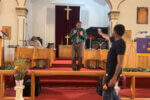Among the working class, it is common knowledge that the sick are being prayed for and healing is occurring. The gospel is being preached at work, and unsaved business people are getting saved. Deliverance is taking place as greed and injustice move out to make way for justice and righteousness.
AN OLD CONFLICT I suggest that the tension between the nuclear church and the extended church is not new. In fact, it is not unreasonable to note that the modern-day conflict between the two groups bears amazing similarity to what happened between the church in Jerusalem and the church at Antioch during a pivotal time in history.
The church in Jerusalem had heard about a move of God in Antioch, where God ought not to be. Concerned that a cult was arising there, the Jerusalem brethren sent Barnabas to check it out (see Acts 11:19-26).
Antioch was an entirely different kind of city than Jerusalem, and Barnabas found an entirely different kind of church there. It did not resemble the mother church in Jerusalem in any way. To start with, it was filled not with Jewish believers but with Gentile God-fearers.
It was not a proper church. There were no ordained people running it. It was out of order, and it was difficult to figure out who was in charge.
And yet, the power of the Holy Spirit was all over the place. Barnabas recognized that what was going on was an undeniable move of God.
Clearly, the Antioch church needed an apostle, but who? Barnabas left the city, made a right turn and went to Arabia in search of Paul and brought him to Antioch (see Acts 11:25-26).
Paul had the attention of the people immediately because his reputation was well-known. He had been a soldier, a persecutor of the people of “the way,” but had now become a born-again evangelist to the very people he once tried to imprison.
The stories of Saul of Tarsus, now Paul the apostle, were still alive and well in the rumor mill. Paul began to preach to the people in Antioch and they listened–if for no other reason than to hear what such a man might have to say.
Asking permission of no one, not even the Jerusalem church, Paul summarily removed the stumbling blocks that had served as a “Do Not Enter” sign to these potential converts to the faith. Paul blatantly told Gentile believers, contrary to conventional wisdom of the day, that they did not have to get circumcised and that they could be saved without obeying the Mosaic Law (see Acts 13:38-39).
The mother church in Jerusalem became concerned about what was happening in Antioch among the uncircumcised Gentiles, who claimed to be true believers in Jesus Christ. It was this conflict between the organized proper church and the unorthodox church at Antioch that caused the council at Jerusalem to convene (see Acts 15:1-6).
The issue was so important that the apostles and elders came to town for the meeting. Luke reports that the brothers were glad, but there is no indication that the apostles and elders were glad to hear about revival among the Gentiles (see v. 3).
At a crucial point in the meeting, Peter stood to address the gathering. Had you been there you could have heard the proverbial pin drop. Why? Because 10 years before this, the Lord had showed Peter the acceptance of the Gentiles through a dream of a sheet coming down from heaven. As a result of the dream, Peter went to a Gentile’s house, the Holy Spirit came upon them, and Peter baptized the whole lot (see Acts 9:1-48).
Peter’s words helped diffuse a potentially explosive situation. When he concluded, Paul and Barnabas told of the miracles they had witnessed among the Gentiles. This must have satisfied the apostles and elders, who were pleased to draft a decree that would encourage and embrace those Gentiles who were of the faith (see Acts 22-29).
You may be wondering if the rise of the extended church in the workplace is as serious as all that. It is indeed that serious. We are witnessing the same potential for a kingdom divided as was possible between the proper church of Jerusalem and the raucous church of Antioch.
CLASHING CHURCH CULTURES Something akin to the Jerusalem council may have to occur between the apostles of the workplace church and the apostles of the traditional church. The nuclear church will not be able to close the door God is opening to a full-throttle, Holy Ghost, signs-and-wonders outpouring on people whom He has sovereignly chosen.
Many of these are people who have not been to seminary, have not been ordained by a suitable denomination and are not married to any denominational doctrine. They are men and women who are passionate about Jesus and really believe they can do what they perceive the nuclear church has struggled to do. They know they are called, and they intend to answer the call.








Leave a Comment
You must be logged in to post a comment.